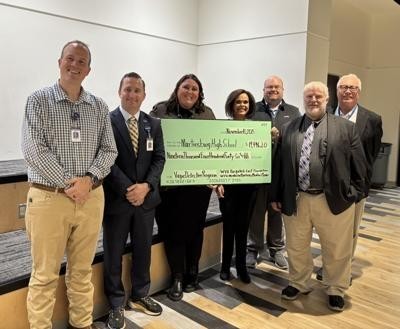Article by Ainsley Hall and published in The Journal on November 12, 2025, for article click HERE.
Martinsburg High School received a check from West Virginia University Medicine to go toward vape detectors as they begin a new educational campaign to teach students the dangers of vaping. The $19,446.20 check is just the beginning of a partnership to create a better, healthier future for young people as health professionals plan to teach them the importance of taking care of their bodies.
Last year, when Martinsburg High School’s Local School Improvement Council (LSIC) came together to talk about how to improve the school, one of their main focuses was vaping. LSIC member Rick Deuell connected with WVU Medicine to start a new educational program to prevent them from vaping. According to WVU Medicine Regional Medical Director Ben Deuell, many people turned to vape because they thought it was a safe alternative to smoking cigarettes. The truth is there isn’t enough information to know how vaping impacts the body.
“People are realizing vaping isn’t as safe as we thought,” Deuell said. “It can also be a gateway to other alternatives, which can lead to addiction. We want to provide an education and teach kids about the effects of vaping.”
As a Martinsburg High School alumni, Deuell is one of the biggest advocates for the program at WVU Medicine. He’s worked with Rick and Principal Maranda Lynch and staff from WVU Medicine launch the program. Lynch believes that as an educational institution, it’s important that Martinsburg High School gives students a safe space to learn, not just in the classroom, but emotional and physical education.
Once the vape detectors are installed throughout the school, when a student is identified as having a vape, they will be enrolled in the educational program. It will be designed not as a way to discipline students but to educate them and provide them with resources to stop vaping before it leads to other health problems. Some of the main points will be the short and long-term health risk and the toxic chemicals used in vapes, including heavy metals.
“Discipline doesn’t work if they don’t understand why,” Lynch said. “With health professionals at the center they can provide the educational piece we are lacking when it comes to vaping.”
Lynch is thankful for WVU Medicine East CEO Mark O’Hern, Ben Deuell and everyone else from WVU Medicine that made this program possible. She hopes the school will continue to partner with the local hospital moving forward.

